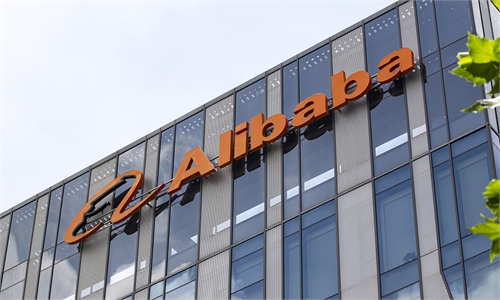COMMENTS / COLUMNISTS
Alibaba likely to emerge from ‘dark woods’ in 2022, albeit facing tougher competition

Alibaba's headquarters in Hangzhou, East China's Zhejiang Province Photo: cnsphoto
China's e-commerce giant Alibaba group experienced its "darkest" year in 2021, as it faced a series of uncertainties including tightened government oversight at home, geopolitical tensions from Washington and US securities authorities' consistent suppression of Chinese public companies. And, bizarrely, a female employee accused her supervisor of sexual assault when they were on a business trip, which seriously distained Alibaba's prestige and public image.The company's shares are now trading at below $120 on the New York Stock Exchange, hitting their lowest level since 2017. In the third quarter, Alibaba missed sales and earnings expectations and had to cut its outlook for the full year.
Last week, the company, during an investors' briefing in Hangzhou, Zhejiang Province, unveiled a turnaround plan, but it failed to impress the market or overcome fears over whether the company could fend off a series of acute challenges.
Competition across the e-commerce sector has become increasingly fierce in China, resulting from the government's significantly stricter antitrust regulation targeting the sector since early 2021. As a result, Alibaba's profit margins suffered in 2021 as Chinese consumers swarmed to rival platforms like Pinduoduo and JD.com to search for low-priced substitutes. Now, internet companies are becoming more cautious about doing anything that resembles strong-arming competitors or end users.
In April this year, the State Administration for Market Regulation, the Chinese government's top market watchdog, imposed a record $2.8 billion antitrust fine on Alibaba following months of investigation that found the giant internet platform has used exclusionary practices, which impeded online retail competition, affected innovation in the internet economy and harmed consumers' rights.
The hefty fine sent a clear message to China's high-flying internet industry that the regulators will be keeping an eye on all major market players - don't be monopolistic and manipulating one's market power. In October, Chinese delivery giant Meituan group was fined a massive $530 million for violating anti-monopoly regulations.
The Chinese government's campaign to ramp up antitrust scrutiny has been welcomed by enthusiastic consumers, and the efforts are already starting to influence the way the country's internet platforms operate. For an example, Tencent Holdings, another internet titan in China, announced in July it would give up music label exclusivity to outpace its rivals, and the company's original plan to merge the country's two largest video game streaming sites was scrapped because the regulators warned the merger would negatively impact market competition.
By restricting "Big Tech" from forming business monopolies in the country, smaller Chinese enterprises' interests are being protected, and Chinese consumers have more choices on the market.
The government's antitrust efforts have also played a role in preventing giant internet platforms from over-charging consumers or price-gouging, which helps keep overall price levels at a lower level in China. Compared with American technology giants like Amazon, Apple and Google, it is apparent that Beijing has been more effective in reining in domestic "Big Tech" from forming monopolies or oligarchies.
At a time when competitive intensity levels up in China, Alibaba is increasing investments in both defensive and offensive strategies to attract more end users, retain more merchants and build multiple traffic sources, in order to reach its goal of accessing one billion Chinese annual active users. The company has also planned to augment its cloud computing business and expand international commerce in the Southeast Asia region where e-commerce is now growing very fast.
Over the coming months, Alibaba group will pursue a more segmented shift, moving from a super-app strategy to a multi-app entry strategy, which is expected to assist the company to better respond to market competition. And, Alibaba should be able to strengthen its core e-commerce business in tier-one and tier-two Chinese cities by tapping into its technological advantages in AI and big data insights.
Alibaba ought to learn from fellow Chinese internet giant ByteDance, whose TikTok app beat Google and Facebook to become the most visited site worldwide this year. Top Alibaba executives has set a $100 billion gross merchandise value target for its Southeast Asian e-commerce app, Lazada, and outlined a range of initiatives that will align the company more closely with Chinese government's policy priority, which is obviously a wise move. Lazada is now the third largest online retailer in emerging markets.
However, there are significant challenges facing Alibaba. While the company has cited a number of growth areas, many of their new segments are now losing money and require sustained investment. Facing steadily growing competition, Alibaba executives need to think over its strategy and stay focused on e-commerce expansion beyond the Chinese market.
The author is an editor with the Global Times. bizopinion@globaltimes.com.cn



